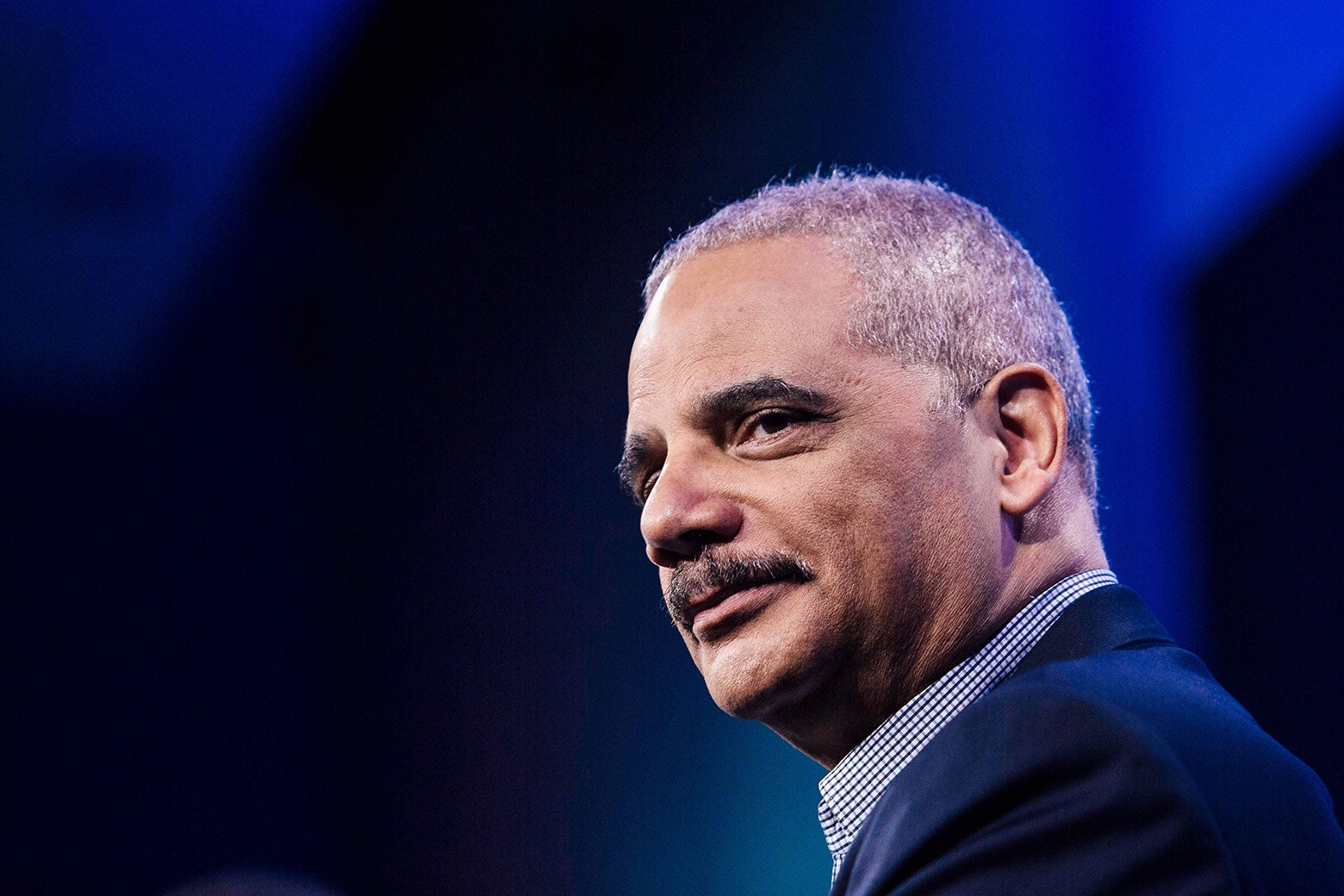Eric Holder was the first black attorney general of the United States, serving under its first black president, Barack Obama. Holder left office in 2013, but he hasn’t left public life. And for a second act, he’s considering politics and a bid to serve as the second black occupant of the White House.
During a Tuesday interview with MSNBC’s Chris Hayes, Holder said he was considering a run in 2020. “Yes, I’m thinking about it, but I’ve not made any determinations,” he said. At Al Sharpton’s National Action Network conference on Wednesday, Holder sounded like a candidate, blasting the Trump administration for its approach to criminal justice. “The present administration wants to take us back to the failed leadership of the past,” he said. “They’re not being tough on crime. They’re not being smart on crime. They’re being dumb on crime. [The] formerly incarcerated continue to face significant obstacles, and they now face a hostile administration intent on making law enforcement an instrument of the fear they use to divide and try to govern us.” It was enough to prompt a “Run, Eric, run!” chant from Sharpton that the audience indulged.
This isn’t the first time Holder has spoken about his presidential ambitions. “Up to now, I have been more behind the scenes,” he last year in an interview with Yahoo News. “But that’s about to change. I have a certain status as the former attorney general. A certain familiarity as the first African American attorney general. There’s a justified perception that I’m close to President Obama.” He added: “Now is the time to be more visible. Now is the time to be heard.” Earlier this year, Holder refused to rule out the possibility, telling a reporter that he’ll “make a decision by the end of the year about whether there is another chapter” in his government service. It’s of note, on this score, that Holder will travel to New Hampshire in June to participate in Politics and Eggs, an annual breakfast meet-and-greet that often features presidential contenders. Past attendees include Ted Cruz, John Kasich, and Hillary Clinton.
It’s not crazy for Holder to mull a presidential run. He is close to Obama, with a record of action on criminal justice reform. He’s never held elected office, but that’s no obstacle—President Trump, after all, is a complete newcomer to public service.
Still, it’s certainly unusual. Sharpton might be enthusiastic for Holder, but the former attorney general has no natural constituency to speak of. And while Holder has his share of accomplishments—around criminal justice reform, voting rights, and civil rights—he also has real liabilities, most importantly his failure to prosecute big banks and other bad actors in the wake of the 2007 financial crisis. Progressives are certain to have an outsized voice in the 2020 Democratic primary, and Holder has not endeared himself to those who believe the government should take a harsher, more aggressive line on financial crime.
At this stage, there’s not much value in assessing the viability of a Holder campaign. What’s worthwhile is to look at what it tells us that Holder—an unconventional newcomer to electoral politics—is even considering a run for the Oval Office.
First, the Democratic presidential field is truly wide open. In the absence of a presumptive front-runner or even an agreed-upon leader, the door is wide open for anyone to run. That means high-profile figures in Washington such as Bernie Sanders, Elizabeth Warren, Kamala Harris, Kirsten Gillibrand, and Cory Booker; governors (or former governors) such as Terry McAuliffe of Virginia, Andrew Cuomo of New York, and John Hickenlooper of Colorado; big-city mayors such as Eric Garcetti of Los Angeles, Mitch Landrieu of New Orleans, and Bill de Blasio of New York; and even outside figures such as California billionaire Tom Steyer, media mogul Oprah Winfrey, and yes, Eric Holder. If Donald Trump can become president, anyone can become president, and the burgeoning Democratic field reflects that.
The second point is related to the first: Nearly every Democrat under the sun views Trump as weak and vulnerable to whoever might capture the party’s nomination. An environment where Holder is a credible candidate for president is one where most people are betting on the incumbent’s defeat. There are good reasons to make that assumption. President Trump is mired in scandal, his associates are under federal investigation, and law enforcement has turned its attention to his financial relationships. His only legislative achievement is widely disliked, and he’s otherwise ceded his agenda to a dysfunctional Republican majority. He’s historically unpopular and faces an opposition wave at the polls in November. He may even face a Republican challenger. John Kasich is reportedly weighing options for a bid, and according to the New York Times, “Republicans close to the White House whisper about the prospect of an alliance between [Nikki] Haley and Vice President Mike Pence, possibly to run as a ticket in 2020.” You could do worse than to bet on Trump’s eventual defeat.
Then again, incumbency is a powerful force, and Trump has economic wind at his back. If the economy in 2020 is where it is now, the president could win. Against a lackluster Democrat, he might even be a favorite. Perhaps it’s right to doubt Trump’s political survival. But he’s already won once. It’s far from a stretch to think he could do it again.
